That Hoarder: Overcome Compulsive Hoarding
Hoarding disorder is stigmatised and people who hoard feel vast amounts of shame. This podcast began life as an audio diary, an anonymous outlet for somebody with this weird condition. That Hoarder speaks about her experiences living with compulsive hoarding, she interviews therapists, academics, researchers, children of hoarders, professional organisers and influencers, and she shares insight and tips for others with the problem. Listened to by people who hoard as well as those who love them and those who work with them, Overcome Compulsive Hoarding with That Hoarder aims to shatter the stigma, share the truth and speak openly and honestly to improve lives.
Episodes

Friday Jun 21, 2024
Friday Jun 21, 2024
Come to a Dehoarding Accountability Zoom Session: http://www.overcomecompulsivehoarding.co.uk/ticket
Subscribe to the podcast: https://www.overcomecompulsivehoarding.co.uk/subscribe
Podcast show notes, links and transcript: http://www.overcomecompulsivehoarding.co.uk/
Dr. Jennifer Krafft, director of the Mindfulness and Acceptance Lab at Mississippi State University and her expertise in hoarding disorder, OCD, anxiety, and mindfulness and acceptance processes for treatment brings a fresh perspective to the prevalent issues surrounding hoarding. We’re talking particularly about stigma and hoarding disorder, the impact of cultural and societal attitudes, and the potential for self-help interventions to reduce stigma. We look at the roles of psychological flexibility, self-compassion, and the need for societal change in addressing hoarding stigma.
Stigma and Misconceptions Surrounding Hoarding Disorder
Lack of public awareness and understanding
Sensationalism in reality TV shows and its impact on stigmatisation
Impact of hoarding stigma on seeking help and social lives
Mindfulness and Acceptance in Managing Hoarding Disorder
Dr. Jennifer Krafft's personal experiences and curiosity leading to interest in hoarding disorder
Lack of effective treatments and trained providers for hoarding disorder
Study on self-help interventions reducing stigmatisation for people with hoarding disorder
Combating perfectionism through flexibility and managing cognitive reactions
Seeking Help and Self-Stigma
Dr. Jennifer Krafft's study on individuals' preferences for seeking help for mental health problems
Public stigma and self-stigma, leading to shame, embarrassment, and hiding behaviour
Psychological inflexibility linked to stigma and rigid behaviour patterns
Acceptance and commitment therapy promoting psychological flexibility
Addressing Stigma and Shame
Impact of intersecting stigmas on individuals, such as hoarding and racism
Addressing self-criticism, shame, and seeking support
Mindfulness exercises and self-compassion in managing stigma and shame
Cultural and Identity Perspectives in Hoarding Disorder
Lack of research on culture, identity, and hoarding, particularly in diverse populations
Additional challenges faced by individuals with multiple forms of discrimination
Acknowledging the impact of intersecting stigmas on individuals
Evolutionary Perspective of Hoarding Behaviour
Dr. Jennifer Krafft discussing hoarding behaviour in the context of human evolution
Mismatch between human adaptation and the current society's abundance of material possessions
Promoting Awareness and Education
Dr. Jennifer Krafft's advocacy for societal change in addressing hoarding stigma
Necessity for professional education and awareness about hoarding disorder
Lack of research on culture, identity, and hoarding, particularly in diverse populations
Each of these topics delves into the complexities and implications of hoarding disorder, shedding light on the need for compassion, understanding, and effective interventions.
Reality TV impacts public perception of hoarding.
Insufficient research on hoarding and identity discrimination.
Negative thoughts and emotions control behaviour; impacts stigma.
Identifying and challenging perfectionism in daily life.
Seeking support, not meant to be isolated.
Consider the adaptive nature of hoarding behaviour.
Dehoarding Zoom sessions help with self-judgment.
Acceptance and commitment therapy promotes psychological flexibility to navigate stigma effectively.
Insufficient research on hoarding and identity, leading to potential discrimination.
Psychological inflexibility leads to stigma. Acceptance and commitment therapy can help.
Researcher discusses unexpected study findings, biases
Intrinsic motivation in decluttering.
Seek support from others, fight hoarding stigma.
Evolutionary perspective on hoarding behaviour and the potential benefits of hoarding in certain contexts
Zoom accountability sessions for decluttering, self-judgment comparison.
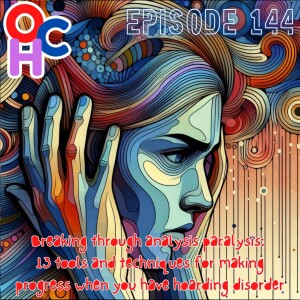
Friday Jun 14, 2024
Friday Jun 14, 2024
Come to a Dehoarding Accountability Zoom Session: http://www.overcomecompulsivehoarding.co.uk/ticket
Subscribe to the podcast: https://www.overcomecompulsivehoarding.co.uk/subscribe
Podcast show notes, links and transcript: http://www.overcomecompulsivehoarding.co.uk/
Today, I focus on the dreaded "analysis paralysis" and how it affects individuals with hoarding disorder. I discuss practical strategies for making decisions easier and breaking through the overwhelming feeling of being stuck in the decision-making process. From setting time limits to reframing fear, I will talk you through the steps to overcoming paralysis and perfectionism.
Analysis Paralysis and Hoarding Disorder
Definition of analysis paralysis
Overwhelmed by options and freezing due to overanalysing
Negative impact of perfectionism and fear of uncertainty on decision-making
Feeling overwhelmed by choices
Getting stuck in overanalysing
Impact of perfectionism on decision-making
Fear of uncertainty hindering progress
Strategies to Overcome Analysis Paralysis
Using systems or rules to make decisions easier
Setting time limits to create focus and reduce overwhelm
Practicing with small decisions to build confidence
Grounding oneself in the present and breaking tasks into smaller chunks
Having a decision-making framework or process to aid in breaking through analysis paralysis
Techniques such as pros and cons lists, cost benefit analysis, and setting rules to make decisions easier
Importance of setting criteria to aid decision-making
Making use of time limits to create focus
Building confidence through practicing with small decisions
Breaking tasks into smaller, more manageable chunks
Prioritising Progress Over Perfection
Encouragement to start small, even if something seems impossible or too difficult
Strategic questions, setting a timer, joining an accountability group, and focusing on the present moment to overcome paralysis and perfectionism
Emphasising the importance of progress over perfection
Starting with small, achievable goals
Using strategic questions and setting timers for focus
Utilising support systems like accountability groups
The emphasis on progress over perfection
Overcoming analysis paralysis through implementing systems.
Overcome perfectionism and fear by taking action.
Refocus on positive possibilities to overcome fear.
Focus on 20-minute tasks to avoid overwhelm.
Start with small decisions to build confidence.
Focus on the present, break tasks down.
Focusing on first step, making decisions easier.
Simplify decision-making process to ease overthinking.
Overcome perfectionism and fear of uncertainty by taking action and learning as you go.
Changing mindset from fear to possibility, reframing challenges and gaining perspective.
Focusing on 20-minute tasks helps with overwhelm and promotes action.
Start small, build confidence to overcome hoarding.
Focus on the present, break tasks into smaller chunks.
Start with first step, use decision making framework to break through analysis paralysis.
Tips for overcoming paralysis and overthinking: use pros and cons lists, cost benefit analysis, and practice to build confidence.
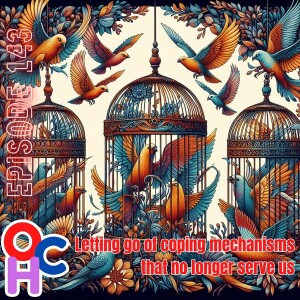
Friday Jun 07, 2024
Friday Jun 07, 2024
Come to a Dehoarding Accountability Zoom Session: http://www.overcomecompulsivehoarding.co.uk/ticket
Subscribe to the podcast: https://www.overcomecompulsivehoarding.co.uk/subscribe
Podcast show notes, links and transcript: http://www.overcomecompulsivehoarding.co.uk/
I have a bit of an emotional moment in this one! In this episode, I talk about how we can spot those things that may have been useful at one point but are limiting us now. And look at how we can start to even entertain the idea of moving away from them without getting overwhelmed by the things that we're running away from in the first place.
Identifying coping mechanisms that have become detrimental
How once-helpful behaviours or thoughts can now cause stress, annoyance, or interfere with work and relationships
Acknowledging the negative impact of these coping mechanisms
Letting Go of Detrimental Coping Mechanisms
Symbolism of finding freedom after letting go of detrimental habits
Thanking coping mechanisms for past usefulness while acknowledging their current negative impact
The process of letting go described as taking small steps
Emphasising gradual change rather than extreme transformation
My experience of letting go of self-harm as a coping mechanism
Therapist's advice to apply the same principle to hoarding
Reflecting on past coping mechanisms and their evolution
Reassessing the need for detailed to-do lists as a coping mechanism for insecurity and fear
Overcoming Adversity and Achieving Small Victories
The power of achieving small victories
Using every bit of progress to fuel the next step, even if it feels impossible
Identifying the benefits derived from hoarding and finding alternative positive coping mechanisms
Adopting Positive Behaviours and Embracing Change
Importance of trial and error and gradual change in adopting positive behaviours
Encouraging curiosity and open-mindedness
Acknowledging that change doesn't have to happen all at once
Our lives can be better without the distress-causing coping mechanisms
Support and Community
Invitation to hoarders for an event for support and discussion
Acknowledging past coping mechanisms, embracing self-acceptance.
Struggling with past coping mechanisms; learning to let go.
Identify harmful coping mechanisms to improve well-being.
Understanding underlying emotional needs.
Reflect on coping mechanisms, assess their effectiveness.
Identify and let go of problematic coping mechanisms, consider letting go of hoarding behaviours.
Reflect on positive moments, gently acknowledge the problems.
Find positive coping mechanisms, assess their effectiveness, and make gradual changes.
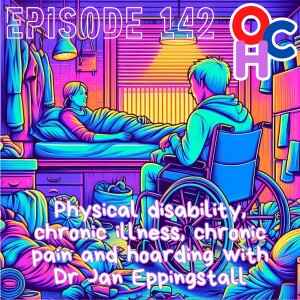
Friday May 31, 2024
Friday May 31, 2024
Come to a Dehoarding Accountability Zoom Session: http://www.overcomecompulsivehoarding.co.uk/ticket
Subscribe to the podcast: https://www.overcomecompulsivehoarding.co.uk/subscribe
Podcast show notes, links and transcript: http://www.overcomecompulsivehoarding.co.uk/
We need to talk about hoarding and physical disabilities, chronic illness, and chronic pain. With the inimitable Dr. Jan Eppingstall, I look at the unique challenges faced by individuals with disabilities, chronic health conditions who hoard. From the impact of aging on hoarding tendencies to the struggles of navigating a hoarded space while managing chronic pain, we offer insights and practical strategies for those dealing with hoarding and physical limitations. Join us as we delve into the complexities of hoarding and its intersection with physical health challenges in a compassionate and informative discussion.
The Impact of Disabilities on Hoarding Behaviours
Complex relationship between hoarding and disabilities
Chronic pain, mental health issues, and aging
The prevalence and severity of hoarding in correlation with aging and physical limitations
The challenges of categorising people and their impairments
Gender Disparities and Disabilities in Hoarding research
The association between physical disabilities, chronic illness, and chronic pain with hoarding, particularly among women
The link between autoimmune diseases, common in women, and hoarding
The impact of poverty on disabilities and hoarding
Advocacy challenges for women with disabilities and hoarding behaviours
The need for women to better acknowledge their achievements without feeling like boasting
The significance of functional impairment in the discussion
The importance of persistently seeking medical help despite the gender pain gap and lack of specificity in symptoms
Strategies for individuals to lead a more independent and fulfilling life despite chronic issues
The effects of giving up on seeking medical help on documenting conditions and receiving appropriate care
Managing Hoarding and Disabilities
Balancing function over appearance for hoarders with chronic health problems
The individuals' strong attachment to certain aesthetics and struggles in decluttering due to sentimental attachment
Practical ways to seek help and simplify tasks for people with hoarding tendencies, particularly for those living alone
Strategies for managing household tasks despite limited mobility
The importance of pacing oneself and not pushing beyond physical limits
The impact of spending time outdoors on mental and physical health
Challenges of Aging and Hoarding
Accumulation of belongings over a lifetime, particularly among older generations
Reluctance to part with items due to sentimental attachment and difficulty decluttering with physical limitations
The isolation and loneliness experienced by older individuals in decluttering and organising tasks
Addressing the challenges faced by hoarders with physical limitations, including lifting, fine motor skills, and brain fog
The impact of limited energy and the need for careful prioritisation of tasks
Living with Physical Health Problems in a Hoarded Environment
The physical and emotional challenges of living with physical health problems
Managing disabilities and planning, scheduling appointments, and attending to physical needs in a hoarded space
The increased energy consumption living in a hoarded space
Navigating chronic pain and strategies to manage dehoarding tasks even on bad pain days
Differentiating between tasks that move the needle and those that simply paper over the cracks
Hoarding research shows self-selection bias towards females.
Hoarding increases with age, affecting functionality.
Disability requires more planning and preparation.
Living with physical limitations is never straightforward.
Self-compassion improved my situation.
Avoid pushing too hard, limit activities to 3 hours.
Hoarding and function over appearance for health.
Assessing and adjusting belongings to create harmony.
Study on disability assessments, measuring functional impairment in 6 areas.
Moving away from cause and effect to individual change and vulnerability.
More planning for disability due to brain fog.
People underestimate complexity of physical disabilities.
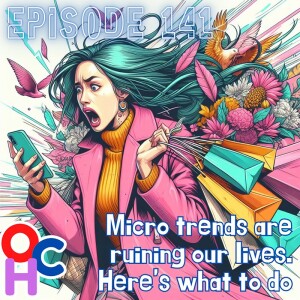
Friday May 24, 2024
Friday May 24, 2024
Come to a Dehoarding Accountability Zoom Session: http://www.overcomecompulsivehoarding.co.uk/ticket
Subscribe to the podcast: https://www.overcomecompulsivehoarding.co.uk/subscribe
Podcast show notes, links and transcript: http://www.overcomecompulsivehoarding.co.uk/
Today, I look at the impact of micro trends on our lives and how they are contributing to clutter and excessive consumption and the additional challenges hoarders face in this ever-evolving landscape of trends. I look at identifying our true style beyond societal pressures and resisting the temptation of constantly changing trendy items. Join me to explore the consequences of indulging in micro trends, the environmental impact of fast fashion, and strategies to make mindful purchasing decisions in a world dominated by fleeting trends.
Impact of Microtrends on Hoarding Behaviour
Hoarders facing unique challenges with microtrends
Consequences of indulging in microtrends such as financial strain and accumulation of belongings
Resisting the Temptation of Microtrends
Avoiding constantly changing trendy items
Thought exercise to identify personal style beyond external influences
Understanding individual style versus succumbing to marketing influences
Questioning motivations behind purchasing new trends
Mindful Purchasing and Consumption
"One in, one out" approach to purchases
Delaying purchases to assess genuine interest
Identifying if existing items can serve the same purpose
Evolution of Trends and Impact of Social Media
Trends in fashion and design propelled by personal expression and corporate marketing
Acceleration of trends through social media platforms
Accumulation of items due to shorter trend cycles and excessive consumption
Environmental and Social Impact
Production and consumption of fast, low-quality products contributing to waste
Struggle of charity shops to sell items from past micro trends
Encouraging individuals to opt out of supporting fleeting trends
By addressing these topics, the podcast provides a comprehensive exploration of how microtrends impact hoarding behaviour, strategies for resisting trends, and insights into the broader societal and environmental implications of excessive consumption.
FOMO in micro trends: dopamine, immediate reward.
Consider the real reasons for wanting something.
Consider delaying purchases to avoid micro trends.
Hoarders face challenges with microtrends, self-control.
Desire for personalization and expression; trends and fashions driven by corporations to fuel spending.
Accumulation of unused items, struggle to declutter.
FOMO in micro trends leads to regretful charity shop donations.
Questioning motives, mindful consumption.
Consider delaying purchases to assess true desire and value. Immediate craving may indicate fleeting trend.
Microtrends are a challenge for hoarders, leading to more stuff, less money, and self-doubt.
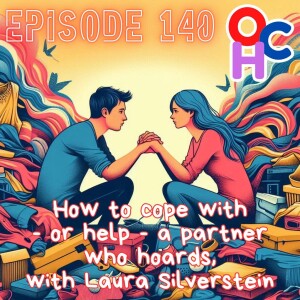
Friday May 17, 2024
Friday May 17, 2024
Come to a Dehoarding Accountability Zoom Session: http://www.overcomecompulsivehoarding.co.uk/ticket
Subscribe to the podcast: https://www.overcomecompulsivehoarding.co.uk/subscribe
Podcast show notes, links and transcript: https://www.overcomecompulsivehoarding.co.uk/podcast-ep-140-how-to-cope-with-or-help-a-partner-who-hoards-with-laura-silverstein-certified-gottman-couples-therapist/
This week, I’m with Laura Silverstein, a Certified Gottman Couples Therapist, who is a genius on how couples can improve their communication and the way they take each other’s needs into account. So we explore the complexities of living with a hoarding partner and the impact it has on relationships.
Laura provides anecdotes and advice on setting healthy boundaries, initiating difficult conversations, and the role of a therapist in couples therapy. We also discuss the value of authentic communication, empathy, and the idea that love requires continuous effort.
We look at the difficulties non-hoarding partners face in understanding their hoarding significant other, the impact of unresolved conflicts, and the evolving perception of quirks in a relationship. The conversation highlights the importance of open and honest communication, emphasising the need for both partners to be involved in decluttering decisions.
Join us as we talk about coping with – and helping – a hoarding partner in a relationship.
Living with a Hoarding Partner
Challenges for the non-hoarding partner
Understanding hoarding behaviour
Impact of conflict in relationships
Approaching hoarding issues as a couple
Communication and Decision Making
Importance of open and honest communication
Involving the hoarding partner in decluttering decisions
Examples of different approaches to decluttering
Setting Boundaries and Deal Breakers
Clear communication and healthy boundary setting
Communicating core needs with a partner
A therapist's role in helping couples set boundaries
Couples Therapy and Relationship Dynamics
Role of a Therapist in Couples Therapy
Encouraging honest and respectful communication
The goal of therapy in relationships
Valuing the time spent in a relationship
Initiating and Navigating Difficult Conversations
Approaching conversations in a positive and constructive way
The "I like, I wish, I wonder" framework for expressing emotions and requests
The importance of clear communication and avoiding misunderstandings
Building and Sustaining Relationships
Acknowledging each partner's needs
Significance of authenticity, empathy, and mutual understanding
Challenging topic of hoarding and relationship conflict.
Understanding and accepting challenges of hoarding disorder.
Improving communication, appreciating efforts, and showing love.
Authenticity in relationships and understanding partner's pain.
Respect partner's wisdom, avoid secrets and betrayal.
Honesty and understanding create helpful solutions.
Fear of hurtful conversations hinders creative solutions.
Setting boundaries is important for relationships.
Progress is non-linear
Seeking respectful closure through difficult conversations is success.
Leaving with integrity and seeking support.
It's important to normalise conflict and focus on repairing relationships through understanding, communication, and meeting each other's needs.
Importance of embracing differences in love and relationships.
Advocate for needs
Common conflict communication pattern is attack-defend.
Skilled communication improves relationships.
Acknowledging past communication issues, understanding partner's challenges, emphasising authenticity and love in communication.
Authentic empathy and communication are key in addressing relationship struggles and finding mutual understanding and support.
Focus on trust and communication in relationships to address hoarding issues.
Discussing how to handle hoarding sensitively and considering different scenarios before making decisions.
Honest communication and creativity in relationships.
Fear of difficult conversations hinders creativity and problem-solving in relationships.
Setting boundaries is crucial for maintaining integrity in relationships.
Success in helping people navigate difficult relationship conversations, with respect and support.
Success is about integrity and treating your partner well, whether working through difficulties or parting ways.
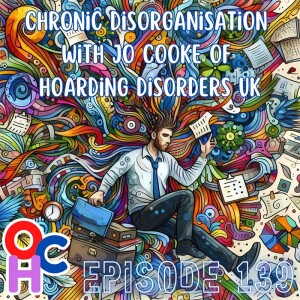
Friday May 10, 2024
Friday May 10, 2024
Sign up for the Dehoarding Accountability Zoom Session: http://www.overcomecompulsivehoarding.co.uk/ticket
Subscribe to the podcast: https://www.overcomecompulsivehoarding.co.uk/subscribe
Podcast show notes and transcript: http://www.overcomecompulsivehoarding.co.uk/
Today, chronic disorganisation with our special guest, Jo Cooke of Hoarding Disorders UK.
Chronic disorganisation impacts day-to-day living, from time management to project completion, and is closely connected to hoarding behaviours.
Jo’s written a whole book on the topic, so join us as we look into the overlap between chronic disorganisation and hoarding, executive dysfunction, and the impact of grief, trauma, and loss on these issues.
Chronic Disorganisation
Definition and impact on day-to-day living
Connection between chronic disorganisation and hoarding
Executive dysfunction and its effect on chronic disorganisation
Understanding and managing energy levels using the "spoon theory"
Physical self-care and its impact on organisation and management
Grief, Trauma, and Menopause
The role of grief, trauma, and loss in chronic disorganisation and hoarding
Societal shift in openly discussing menopause and its impact on daily life
Importance of self-compassion and understanding that disorganisation does not equate to laziness or lack of intelligence
Impact of Covid and Societal Factors
How Covid has impacted people's experiences, including loneliness, anxiety, and chronic overwhelm
Contribution of technology, fast-paced living, and societal expectations to difficulty in focusing and staying on task
Strategies for Managing Chronic Disorganisation
Body doubling as a method to have someone quietly cheerleading alongside on tasks
Importance of sustained attention, goal perseverance, and finding the right motivation and goal-setting approach tailored to individual preferences
Achieving and maintaining focus on tasks through setting achievable goals, tailored to individual needs, and utilising the PACE approach (Playfulness, Acceptance, Curiosity, and Empathy)
Overcoming Chronic Disorganisation
Importance of seeking help, defining what help looks like, and joining support groups to combat shame and self-blame
The release of Jo Cooke's book "Overcoming Chronic Disorganisation" for pre-order and her online presence at hoardingdisordersuk.org
Recognising trends in client needs, including bereavement, ADHD, and menopause, and challenges in organisation.
Chronic disorganisation impacts daily living with system struggles, time management, and tasks.
Hoarding and chronic disorganisation overlap due to executive functioning challenges, leading to repetitive acquisitions and disorganisation.
Modern life is fast-paced with high expectations, leading to difficulty focusing.
Body doubling can help remain on task.
Focus on short and medium-term goals, not just the ultimate goal.
Shame vs joy, playfulness, curiosity, and distress tolerance.
Support group helped challenge self-blame and shame.
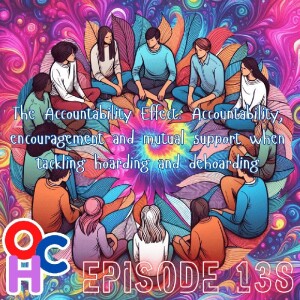
Friday May 03, 2024
Friday May 03, 2024
Subscribe to the podcast: https://www.overcomecompulsivehoarding.co.uk/subscribe
Podcast transcript: https://www.overcomecompulsivehoarding.co.uk/podcast-ep-138-the-accountability-effect-accountability-encouragement-and-mutual-support-when-tackling-hoarding-and-dehoarding/
In today's episode, I talk about holding yourself accountable by yourself. Then I talk about holding yourself accountable if you've got an accountability buddy. And then I'm going to talk about holding yourself accountable if you don't have anybody that you can talk about hoarding with. Because those are 3 really different situations with really different pros and cons and approaches and benefits as well.
Accountability and Dehoarding
An accountability buddy who is also working on dehoarding
Mutual support and encouragement
Honest and constructive feedback
Using before and after photos for accountability and motivation
Setting up times to donate or recycle items together with an accountability buddy
Shared encouragement and sense of accomplishment
Solo Accountability in Dehoarding
Challenges of holding oneself accountable when nobody knows about the hoarding
Joining clutter groups on Facebook or posting on social media for accountability
A group Zoom session for hoarders to hold themselves accountable
Setting external deadlines for accountability
Using inspirational visuals and quotes
Having regular check-ins and task schedules
Tools for Accountability in Dehoarding
Using productivity apps or reminder apps to track progress
Finding features that work best for individual performance
Rewarding oneself with non-material rewards
The Concept of Accountability
Reluctance to commit to accountability
Acknowledgment of its effectiveness in achieving goals
Personal experiences and strategies for self-accountability
Tracking progress and setting deadlines
Holding yourself accountable is crucial for productivity.
Accountability involves planning and setting goals.
Regular check-ins help achieve and motivate goals.
Encourage and support each other for success.
Accountability buddy supports, encourages, and holds responsible.
Setting deadlines and visual, shared encouragement motivates.
Seek accountability through social media and groups.
Accountability involves self-discipline and planning to achieve goals.
Regular self-check-ins help stay on track, providing motivation and a sense of accomplishment.
Encourage support, set same time for tasks, share progress and tips with accountability buddy to overcome obstacles.
Having an accountability buddy offers mutual support, encouragement, and honesty in achieving goals.
Accountability buddy motivates donating items.
Find accountability in decluttering through social media or online groups

Friday Apr 26, 2024
Friday Apr 26, 2024
Subscribe to the podcast: https://www.overcomecompulsivehoarding.co.uk/subscribe
Podcast transcript: https://www.overcomecompulsivehoarding.co.uk/podcast-ep-137-how-to-tackle-a-laundry-backlog-or-how-to-summit-mount-washmore/
Today, the daunting task of tackling a laundry backlog. In this episode, I discuss practical strategies to conquer Mount Washmore and take control of the laundry chaos. From decluttering to creating a laundry system, I look at ways to streamline the process and prevent clothes from piling up. I also touch on the environmental impact of overwashing and share experiences of managing overwhelming laundry situations. So if you're ready to conquer that laundry mountain and reclaim some peace, hit play for some valuable tips and insights.
Addressing the Extreme Laundry Circumstances
Using a laundrette to catch up
Don’t berate yourself for the laundry backlog
Practical Solutions for Managing Laundry Backlog
Declutter to reduce laundry load
Establishing a designated place for dirty clothes and towels
Involving others in the household in the laundry process
Creating a personalised system for ongoing laundry management
Minimizing Overwashing and Unnecessary Clothing Purchases
Advising against overwashing clothes to minimize environmental impact
The environmental impact of overwashing, especially in relation to microplastics and microfibres
Minimising new clothing purchases to reduce laundry load and simplify life
Liberating Feeling of throwing away items in bad condition
Identifying and removing barriers to doing laundry
Streamlining the Washing Process
Sorting laundry into darks, lights, and colours
Containing laundry in bags or containers to streamline the washing process
Disregarding special care instructions and putting items in the washing machine, finding that they come out fine
The gruelling but necessary process of dedicating days to washing laundry, especially without a tumble dryer
Challenge of managing limited drying space
Doing laundry less demanding than cleaning or decluttering
Gratitude for the invention of washing machines
Consideration of organizing a Zoom accountability session for listeners and encouraging them to express interest
Strategies for Tackling Laundry Pile
Prioritising cleaning a few days' worth of clothes before addressing the entire pile
Gathering all dirty laundry in one place and discarding items in bad condition without guilt
Managing laundry by organizing tasks around the workday, not allowing the volume of laundry to overwhelm
Alternative options for managing overwhelming laundry, including using a laundrette or paying for laundry services if necessary to alleviate stress and feeling of being overwhelmed by laundry
Prioritise survival over saving damaged items.
Efficient sorting made laundry process much easier.
Efficient laundry process allows for multitasking.
Outsource your laundry, let someone else handle it.
Delegate laundry tasks, find a system.
Overwashing sheds microplastics, buy less clothing.
Procrastination leads to fear and anxiety. Start by ensuring clean, comfy clothes.
In times of overwhelm, prioritise survival over waste and home livability over personal items.
Without a tumble dryer, drying clothes is limited to 2-3 loads a day, making it difficult to keep things moving without dampness.
It's important to be realistic about what to keep and donate while doing laundry.
Options for laundry: do it yourself, pay for pick-up service, or drop off at a laundromat.
Use a laundrette for extreme laundry situations, without feeling guilty.
Laundry tips for efficiency and delegation.
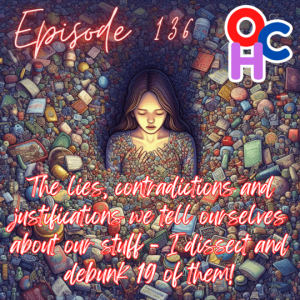
Friday Apr 19, 2024
Friday Apr 19, 2024
Subscribe to the podcast: https://www.overcomecompulsivehoarding.co.uk/subscribe
Podcast transcript: http://www.overcomecompulsivehoarding.co.uk/
In this episode I talk about 19 lies we tell ourselves about our stuff that help us to remain hoarders rather than break free from drowning in stuff.
Acknowledging the Difficulty in Addressing Hoarding Behaviour
Emphasising the possibility of change and the necessity of taking action.
Challenging Justifications for Hoarding
Negative impact on social interactions, emotional well-being, and emergency situations.
The impact of hoarding on children's well-being and long-term trauma.
The inefficiency and laborious nature of selling items from a hoard.
The impracticality of holding onto items because we believe they could be fixed or upcycled.
Setting deadlines for projects to address items awaiting repair or upcycling.
Recognising Lies and Contradictions in Hoarding Behaviour
Separating self-identity from possessions.
Questioning the necessity of holding rare or one-of-a-kind items.
Challenging the belief that items might be needed in the future.
Holding onto clothing that no longer fits.
Challenging the idea of holding onto items in anticipation of them coming back into fashion.
Taking Immediate Action to Address Hoarding Behaviour
Not postponing decluttering and organising efforts.
Challenging the rationale for holding onto items for sentimental reasons.
Considering hosting a virtual accountability group for dehoarding together via Zoom call.
Identifying and Challenging Lies About Belongings
Encouraging listeners to recognise and challenge lies about their belongings.
Addressing beliefs about the necessity of more storage items and the significance of keeping just one item.
Challenging justifications for keeping items, such as receiving them as gifts or having spent money on them.
Emphasising that love and respect for others are not dependent on holding onto objects.
Encouraging letting go of unused items, despite their perceived value or sentimental attachment.
Torn between hoarding and avoiding waste.
Recognise lies, challenge ourselves, become more accountable.
Dehoarding reveals need for less storage.
Overcoming sense of futility, one small effort at a time.
Love doesn't depend on holding onto belongings.
Letting go of excess stuff is liberating.
Don't keep stuff for future fashion trends.
Clutter affects every aspect of your life.
Recognising lies, challenging beliefs, and being accountable for actions.
Don't know what's needed; buying storage adds clutter.
Letting go of stuff creates space for growth and reduces harm.
Delaying decluttering prolongs discomfort. Let go of attachments to things from the past.
Clutter affects mental health and safety, including for children.









